As most of us spend a fair amount of hours a week at work, why not try to live a more sustainable and less wasteful lifestyle at the office, too? Laura Astori shares a few tips on how to introduce more sustainable practices at work and get your colleagues on board.
Office Recycling Tips: How To Achieve Zero Waste To Landfillhttps://t.co/4uDH7Bbkke
— Waster (@waster_com_au) September 23, 2019
Find out how a normal invoice can hugely boost their recycling and save money!#waronwasteau #recycling #zerowasteoffice
A lot has been said about how to make your own home less wasteful and more sustainable. And that’s great! Your home should be the place to start because you can implement your own rules and focus on the aspects you’re most interested in. Most of us, however, spend a fair share of our daily time at work. So, why not try reducing waste in the office, too? Maybe you can even convince some of your co-workers to make it a communal effort?
I thought about this because – despite working for an environmental company myself – I realised that no one in my workplace really took responsibility for implementing what we all preach day in and out. As a result of that, the office ended up being the exact opposite of the sustainable space we are trying to create. I’d like to share here a few simple practices that I (with the help of some committed colleagues) introduced recently into the office to live in a more sustainable way during our eight hours at work.
Reducing plastic waste produced in the company provides tangible benefits to the environment, but it also benefits our business.#ZeroWaste #ZeroWasteOffice #ReducePlastic #SustainableLife #NoPlastic #PlasticPollution #Talentvis pic.twitter.com/d2AK0i8dvx
— Talentvis (@talentvis) July 17, 2019
There’s no need of being an environmental superhero (you can be one, though!), the changes that we brought into the office are simple, easy and almost effort-free; they might even seem obvious concepts but are very often overlooked or underestimated.
Replace plastic cups with glasses and mugs!
Let’s start with a “hot” topic, an evergreen for environmental issues: Plastic! Yes, I know, we are all aware that waste plastic is bad for the environment and that it takes a very long time to decompose. Believe it or not, when I first arrived in what is supposed to be an environmental company, the first thing that I noticed was all the water dispensers with PLASTIC CUPS! On day two in the office, some colleagues and I kindly asked our boss to stop ordering plastic cups and only provide normal glasses (which were already available!). We circulated an email on why we shouldn’t be using them, and the delivery of plastic cups stopped. No plastic cups available = no problem. Everyone started using regular glasses and didn’t even notice the difference. Simple as that.
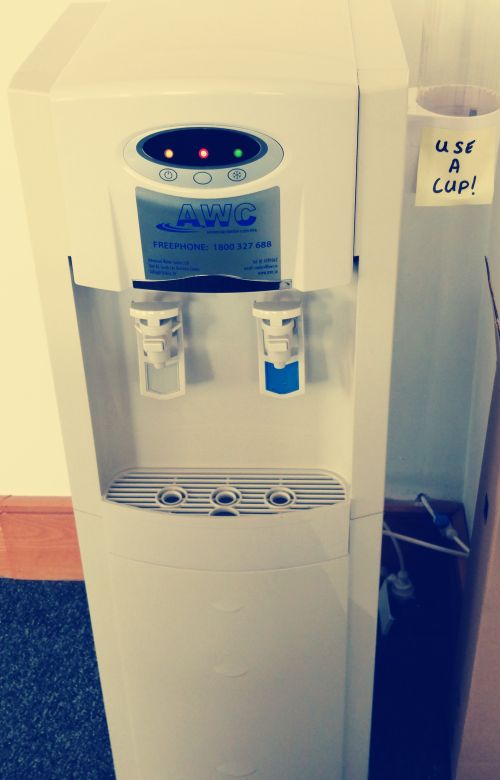
Bring your own lunch!
Continuing this topic, introducing the idea of “bringing your own lunch” was not as easy, since it requires a bit of planning and not everyone has the time or desire to cook. The deal we arrived to among our group is to implement plastic-free Mondays, because everyone should be able to spare half an hour to prepare something on a Sunday for the day after. One day a week doesn’t seem much, but it takes as little to create a habit. A lot of the people that started with one day a week are now making an effort to increase to two/three or more days free of plastic.
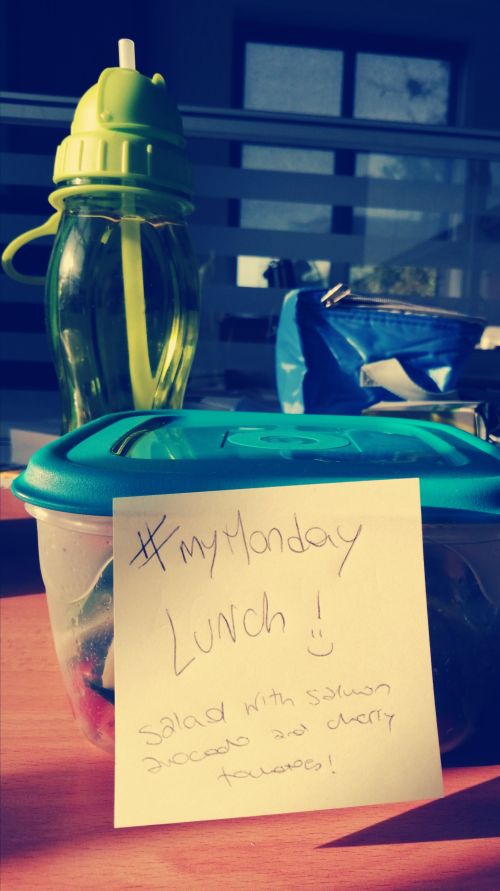
Get a brown bin in the office!
Staying in the “food area”, you might not be aware of the huge environmental impact represented by food waste (in Ireland alone we generate at least 1 million tonnes of food waste each year, and most of it still ends up in landfills). Obviously, the first thing to do to reduce this is to actually try to avoid to generate food waste in the first place. But very often we might still find ourselves with some food bits to throw away and in that case it’s essential to have a bin dedicated to it! Does your working space have a brown bin?
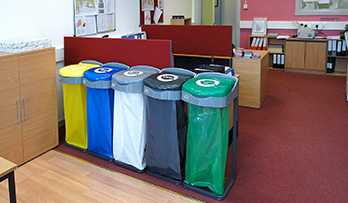
Use recycled paper or go paper free!
Let’s move now to paper. Unless you work in a high-tech company, it’s very likely that the office policy will be far from being “digital only” or “paper free”. Again, no need to revolutionise everything from one day to another, the biggest changes come from small efforts: introducing recycled paper could be one.
One objection could be that “official documents” need to be on white paper? If it’s necessary, just select the documents to print on non-recyclable paper (ideally that shouldn’t really be an issue, of course) and make recycled paper the default. Other than that, simply try to reduce printing in general and favour digital versions; then make sure to print double-sided and diminish the margins to reduce the amount of paper used. We also have a collection of single-sided printed paper next to the printer that can be reused for printing on the virgin side, or used as note paper by any colleague. Once again not rocket-science but a very often unconsidered habit.
Find alternatives in the bathroom!
Paper is not only used for printing, in fact, for what concern my office at least, the biggest amount of paper waste that I could see was done in the bathroom. I’m far from the intention of lecturing on how much toilet paper you should use, but I find it unacceptable that the only way to dry your hands is through paper (that was the case in my office). The easiest and cheapest solution is to provide a couple of hand towels that can be changed (and washed) on a weekly basis. Every office should be able to provide a few towels, if they’re so tight with money they’re probably going bankrupt soon anyway. If money is not an issue you can ask for installing hand dryers (they do not come in cheap, though). Some might argue about the amount of energy used but there are very efficient options out there.
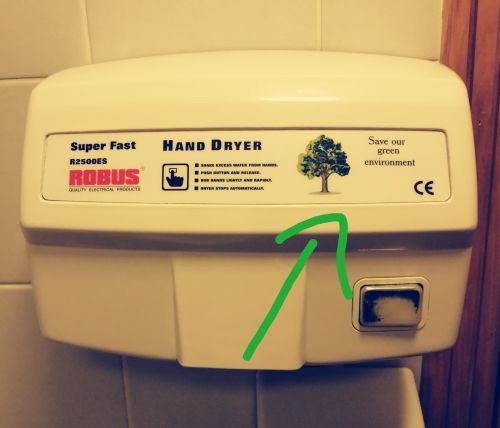
Flush responsibly!
Ok, so we covered plastic and paper: another big one should be water but in a work environment this might be less relevant since the sources of waste are not office-friendly practices (such as showers or washing dishes), my only suggestion here is: don’t use 13 litres of water for your one tissue (that’s roughly how much water we use every time we flush!) in other words: “flush responsibly”.
Switch off!
So finally we arrive at energy. How do we reduce the amount of energy wasted in an office space? Clearly, there’s only so much that we can introduce (you can’t really propose to rewire the entire office, put LED and solar panels on the roof… or well, you can always try!) so what can you effectively do?
Avoid turning on the lights/turn them off when they are not needed is the first basic step. And it’s obvious, you would say, but once again no – it is not as obvious as you might think to a lot of people. Many turn on lights as an automatic act while entering a room, but when the sun is shining outside (provided that there are windows in the room and it is not too overcast outside) is it really necessary?
Unplug!
Unplugging chargers and computers when you are finished using them is another good practice to save energy, it might seem a very minimal save, but in an office with over 50 working computers it adds up! Think twice before instantly turning on the heating or aircon (I had to educate myself here) as a person that truly feels the cold I would always go for a few more degrees on the heating system, very often though a lot of the people that I work with didn’t feel the necessity for it, so I decided to bring an extra jumper to always leave in the office for colder days - and it works fine! I also brought a poncho once to make it a bit more fun. If you use the heating makes sure there are no draft in the room (for example windows not properly closed), it would be a waste and wouldn’t even make you warmer!
Same concept for the air-conditioning. Not everyone likes it, and why not profiting from natural resources, if there’s something Ireland doesn’t lack is the breeze, open a window when it’s too warm and 9 times out of 10 you will do fine; if you really want the aircon on, then make sure to have all your windows closed.
Load up the dishwasher!
To finish up, be careful with the washing-up. Most offices provide dishwashers, make sure to have a full load before starting a washing, and if you have it as an option use the eco-saving mode, it uses less energy and recycles water.
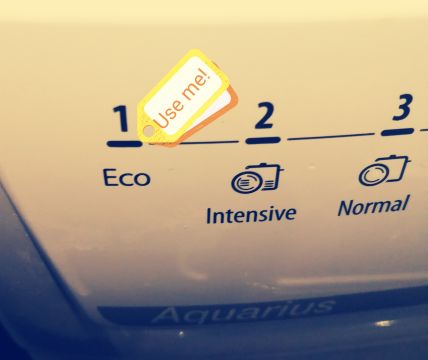
Make it fun!
My very last tip is to try to introduce these practices as a game, a “friendly competition” to change our bad habits… people are more keen on making changes when they are having fun and feel like they are part of a group. Reward the positive accomplishments and incentivise to do even more.